It’s been a long journey as a Scotland fan. Last week’s last-gasp victory against Serbia brought it all back, like a moth to the flame.
Read the rollercoaster ride of old Scotland fan!
Well, well, well Scotland. No one was expecting this. What are you doing? Winning important games at football, abroad of all places!

Not since I threw a despairing mustard cushion at the telly on 24 March 2001, have I felt motivated or engaged.
For a lifelong football fan, that Saturday was a watershed moment.
Scotland threw away a two-goal home lead against 10-man Belgium to draw and crush our hopes of appearing in the World Cup Finals hosted in Japan and South Korea in 2002.
It was a mortal blow.
Nearly 20 years of hurt
This was only the second occasion in my footballing lifetime that Scotland had failed to qualify for a World Cup.
In her 1969 ground-breaking study, Elisabeth Kübler-Ross identified the five-stage model of grief. Just in time Scots baby boomers, like me – born in 1962 – to trudge this very journey.
Denial, Anger, Bargaining, Depression and Acceptance.
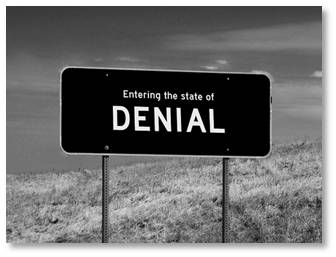
If failing in 1994 to get to the USA World Cup, was denial, then that March Saturday was anger through to depression within 90 minutes.
Acceptance was in the hours and weeks to follow through the bragging of my English workmates and in the years since.
And that was my slow, emotional withdrawal from passionately and publicly supporting the national football team. I could no longer let my heart rule head; no longer let Scotland results dictate my mood, my wellbeing, my (un)happiness.
Girlfriends through the years had already sussed this emotional tick and check the football results to predict my general mood on any given Saturday night.
Every Scot of my age and era has gone through these milestone moments* of anger to acceptance.
(*Subject to conditions, timings, match results and personal mood may vary)
But that’s a huge psychological admission of negativity for a Scottish lad supporting his country in happier times. Where did it all go wrong?
The signs were all there, it just that hindsight makes it so much easier to decode. Here goes!
Those were the days my friend!
It had all started so well as a lad. I say lad, I really mean a socio-economic underdog; black and white telly with a paybox on the back and headlice as standard.
‘Clydebank was so rough even the nit nurses went round in pairs’

It was said that Clydebank was so rough, the nit-nurses as well as the rottweilers went around in pairs.
Along with most of the kids of my era who became teenagers in the 1970s, I grew up a fervent Scotland fan.
Halcyon days like those in the Mary Hopkins song. Those were the days my friend, we thought they never end… when Scotland was regarded as a world footballing power.
But we Scots boys learned the hard way. Hindsight – if not history – is a sore lesson.
My dad wasn’t a big Scotland fan. Not as a paying supporter anyway. He said the SFA and the manager preferred to select Glasgow Rangers players to please the establishment crowd despite Celtic having the better players (and bigger trophy cabinet).
Despite going to Hampden many times as a Celtic fan, I was only there on a few occasions as a member of the Tartan Army.
My first international game was a 2-1 win over Portugal at Hampden in October 1971 in a European qualifier. For our southern visitors I can confirm that this was one of Bob Wilson’s two international caps for Scotland.

Both goal scorers played for Derby County. John O’Hare and Archie Gemmill who had just joined a month earlier from Preston North End on 22 September. I hadn’t realised till compiling this that as a corpulent nine-year old I saw another world great in Eusebio that night when Leeds’s Billy Bremner captained Scotland.
Scotland was a footballing conveyer belt of talent for the English teams. You name the top teams – Leeds, Liverpool, Manchester United, Arsenal – along with local English lads there would be a battalion of bravehearts.

We even had enough quality players still in Scotland to see the likes of Celtic in the final of the European Cup in 1967, 1970 and beaten semi-finalists in 1972 and 1974.
Gallus Glasgow, Super Scotland
In fact, six days after Celtic became the first British side to win the European Cup in 1967, Rangers lost narrowly after extra time to Bayern Munich in the final of the European Cup Winners Cup. The first, if not only time in old money, two teams from the same city have competed for Europe’s top trophies in the same week.
A month earlier in April 1967 Scotland became the first team to beat the world champions, England on their home turf, winning 3-2. Draw your own conclusions how this result was interpreted!
So, growing up had a positive footballing platform to build on. With English relatives, it was a decent time to be a Scotland fan. Qualifying regularly for World Cups; a wee nation of 7 million (now down to five million – but not sure if that’s down Thatcher’s evil policies or poor lifestyle choices) mixing it with the best footballing nations on the globe.
Colour TV
Only wee Gerry Kearns on our estate had a colour telly. And he had one of the futuristic lamps where the strands changed colour. I could watch that thing for hours. Who needed drug addiction when you have fibre optic lamps? This was science fiction made real in Radnor Park.
Me and neighbour Dennis Sweeney would get a big bag of sweets and a gallon of cream soda and go up most years to watch the Home Internationals. The shops wouldn’t sell ketamine to under 12’s without proof of age in those days.
Childhood obesity – I was just ahead of my time. I’ll never forget the day the doctor delivered the bad news to my parents that they would never be able to take me on a narrow boat holiday.
The Scotland v England game was always scheduled last match as the felt like an international cup final; a British World Series to mix sporting metaphors.



Afterwards we would go out with the ball to “the garages” and recreate our own personal Wembley or Hampden moment on the sloping concrete pitch where we honed our silky skills in case we could use them faced with mass unemployment. I pretended to be Alan Rough and let loads of goals in.
God forbid an adventurous touch or overambitious shot took it into the Lockhart or Sherwood’s garden. The latter was likely to keep your ball, burst it with a knife or put it on the garden fire.
Wembley 1977 – the ‘high jinx’

Perhaps sensing what fate was to befall the national team Scotland served up one of their best performances at Wembley in 1977, winning 2-1 with goals from Gordon McQueen and Kenny Dalglish.
While the English press were quick to label the behaviour of the jublilant Scottish fans as “an orgy of destruction”, in Scotland this behaviour is passed off as exuberant high-jinx.

During a fun-filled, celebratory invasion of the pitch at the end of the game. Some stadium accessories were damaged and supporters took grass cuttings as an emotional memento of their bi-annual visit.

Mexico 1970
As a kid it was all football. Obsessively. As well as going to games at Celtic, swapping playing cards in the playground and collecting newspaper cuttings and Panini stickers. If I wasn’t playing it; I was talking about it. I still have a programme and ticket collection as treasured mementoes of those days.
I have a distinct memory of sitting in Dermid Strain’s house in 1969 aged seven when Scotland lost 3-2 to West Germany in Hamburg in a world cup qualifier and the game was on the radio in the background.
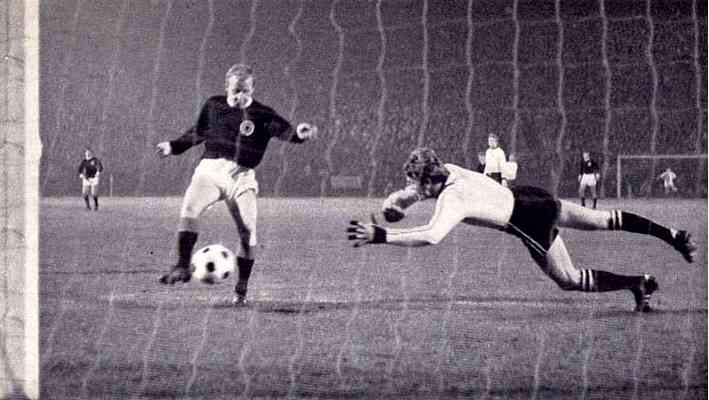
I do have some 1970 World Cup memories but they are fleeting. Alan Clarke’s blue-shirted early morning penalty against Czechoslovakia is my first.
Then Pele versus Moore, that ‘worldie’ Gordon Banks’ save in Guadalajara when Brazil beat England. In fact, until writing this, I hadn’t appreciated this was a group game and not a knock-out stage, which I now recall was the semi-final against West Germany.
I was enthralled by Pele. Even though it didn’t result in a goal his dummy against Uruguay revealed the ability and joy of a quick thinking footballer.
I was smitten. I wanted to be like him. My mum made a number 10 and sewed it onto the back of my yellow tshirt. To this day, those round neck retro shirts of the 70s are iconic reminder of a game played for the joy of it. The beautiful game, epitomised by Pele.

Even the 1970 Mexico font is memorable as post-war black and white gave way to the space age and glorious technicolour. Though that was still seven years away in our house.

West Germany 1978
Aged 12, the 1974 World Cup is my first “real” World Cup with all that entails for a Scottish football fan. I’ll never forget the emotion of Scotland coming from behind to beat Czechoslovakia at Hampden to ensure qualification.
Big Joe Jordan just epitomised the spirit and courage that this wee nation could summon up. Toothless and fearless. The dye was cast, like many my age, I was hooked.

The emotional build up from that September night in 1973 until the finals in the summer of 1974 was incredible.
Media coverage, playground talk and bearing in mind Scotland hadn’t been in the finals since 1954 a generation before.
I read every article and poured over every photograph. It was overwhelming; all consuming.
Scotland was the only British side at the finals so much of the talk centred on our players, north and south of the border. So the focus was even greater.
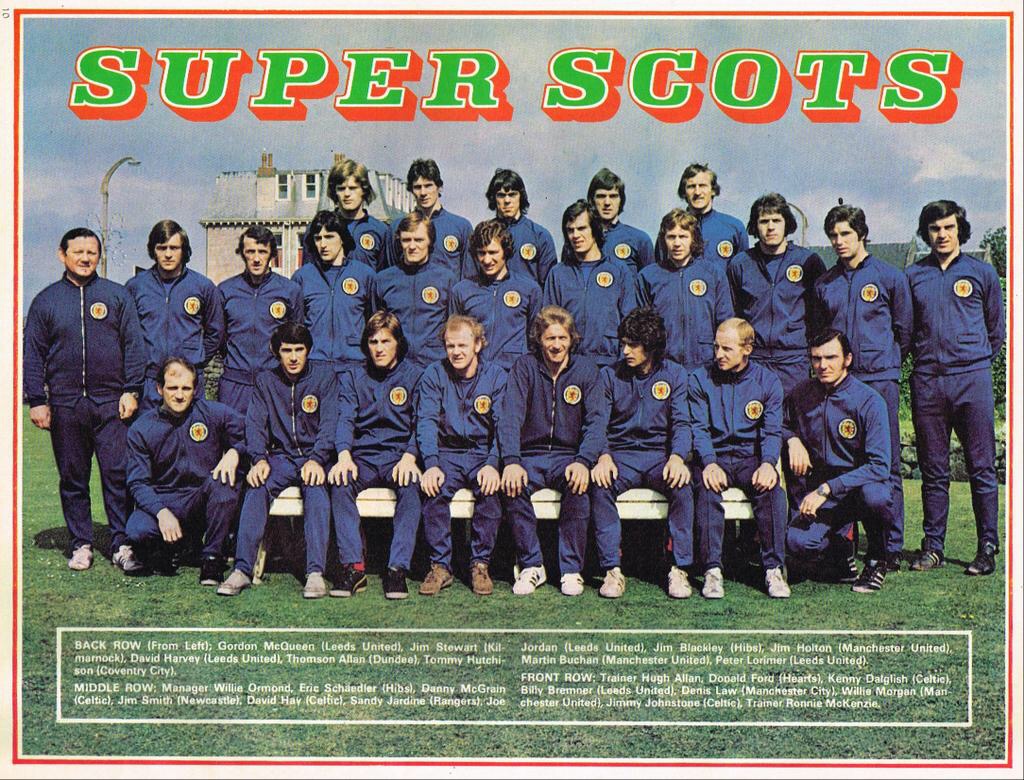
Start as you mean to go on, it ended in glorious failure for Scotland. Drawing 1-1 with the defending world champions Brazil, not scoring enough against Zaire and drawing against Yugoslavia in a fabulous white “away’ kit. Eliminated but heading home unbeaten with our heads held high.
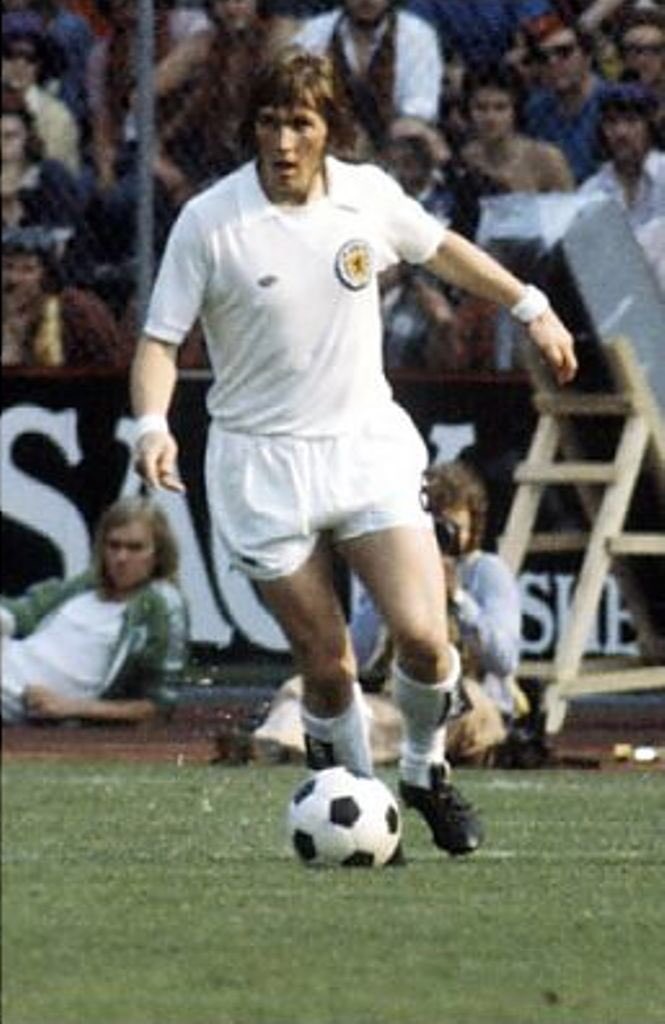
Heroic failure: It was a sign of things to come. An ill-fitting shirt with hair down the back that you couldn’t shake off.
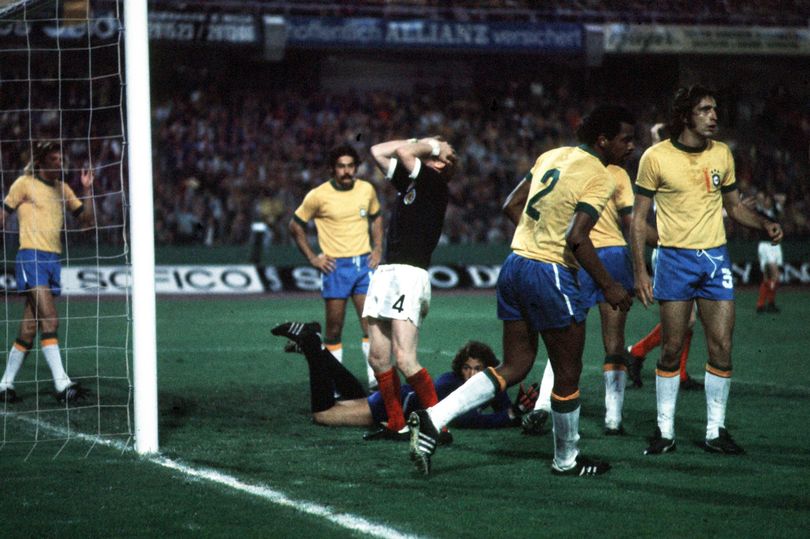
Years later, working as a photographer, I got to visit and cover a Chelsea game in the weird, futuristic Olympiastadion in Munich where Cruyff’s Holland lost to West Germany. Indeed, many of my football travels are inspired by reliving these childhood memories (But there’s another blog about that.)

The fabulous Dutch side were finalists in both 1974 and again in 1978. During Euro 1996, Skinner & Baddiell sung England’s anthem “30 years of hurt” it dawned on me that Holland has never won the World Cup, despite coming so close. For a nation of, then, 12 million, they don’t bump their gums like the English. Just and observation mind you. No malice intended, lol.
After the war, the rubble in Munich was moved out of the city and the stadium was purposely built around the mountain of rock in a symbolic renewal to underline modern post-Nazi, post-war era, rejoining the international family; no longer a pariah.
Argentina 1978
The 1978 World Cup finals in Argentina was the zenith for any Scottish fan my age. Ally’s Army and all that.
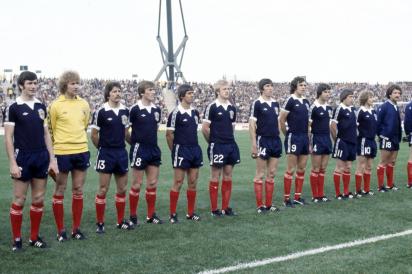
But looking back, this, in my view, was the best Scottish and closest to a world-class team the country would ever put on a football pitch.
‘Scotland’s 1978 squad was… the closest to a world-class team the country would ever put on a football pitch’
I’m personally convinced – and putting it out there to Scots of my era – that the 1978 Scotland World Cup team was – in rational retrospect – the closest our nation ever got to being a great successful team, whatever the historical prism.
For every mediocre player that has ever pulled on a dark blue jersey since, every player in that Argentina squad side would have a chance in play in world eleven. Well, 10 players at least. Obviously I’m not counting Alan Rough!
Despite the still comical failure to qualify, Scotland has never had – and perhaps never again will have – the individual or collective ability to make an impact in international football.
It is a personal retrospective footballing view. Perhaps similar to the England team who, in the 1991, defeated Germany 5-1 in the very same Munich stadium above.
For a small nation, we and England with their golden generation – of Lampard, Beckham and Gerrard – for economic and social reasons as much as football dynamics, may well never gain a similar platform for success or glory.
My appraisal – for what it’s worth – is that if Scotland had beat Iran, drawn with Peru and lost to eventual finalists Holland, they would have had the same points but to a totally different reception back home.
And any number of permutations, including Don Masson scoring at 1-0 against Peru, could have given the nation an entirely different footballing trajectory.
But, hey, life is strewn with what might have beens.
Yes, we did get caught up in the hyperbole and believe we could win. Even The Royal Mail designed a set of stamps in case of that outcome.

Instead we got a great start but a defeat to Peru (what a strip and strike Mr Cubillas), a dour draw with Iran, and a victory against the finalists Holland – with the most remarkable goal ever scored by a wee Scot from Paisley. Anyone notice that working class gob on the way back from it. That is nonchalance.


Spain 1982
If Argentina was the zenith, we were not to know at that point. Again Scotland, as in 1974, won one, drew one and lost one. A group of death saw them paired with Brazil for the second time. And despite a draw with Russia we were again on the plane home.
You can see some themes emerging here. Glorious defeat, group of death, calamitous defending, costly individual mistakes.
In the days of the Soviet empire, the Scots even had a rival ideology when we met them in 1992 in Seville. Again I managed to visit the ground years later when Celtic played in Seville.

By now the national psyche was scarred and the fans and media alike were aware of the monkey on the back. After three world cup exits the pub bragging rights were: “what do you call a Scotsman at knockout stages of the world cup: a referee.”
Or, in reference to elimination on goal difference. “How do to tell a Scotsman at the world Cup? He’s the one with the kilt, the tartan scarf and a calculator.”
It wasn’t that Scotland didn’t have a decent squad. Jordan, Dalglish and Gemmill, had been replaced with the like of Archibald, Brazil, Wark and Hansen. In Spain 1982 Souness was still around as captain.
Again, a group of death and individual shortcomings were to bedevil the Scots. Mr Hansen meet Mr Miller. My ball, no mine.
Contrast this with Northern Ireland who dumped the hosts Spain out with much lower expectations and came home to a heroes’ welcome.
Mexico 1986
I genuinely feel sorry for the Welsh. They have been in Scotland’s qualifying group a couple of times. First Joe Jordan cheated them to gain a penalty and break the deadlock in 1977. Then we beat them in Cardiff the night Jock Stein died. Again with a late Davie Cooper penalty.
Like the Northern Irish, the Welsh have been the bridesmaids of British football. But Stein’s death put a shadow over Scotland. And the Alex Ferguson/Andy Roxburgh era was upon us.
So, in Mexico 1986, Scotland got another group of death – coming last among Denmark, West Germany and Uruguay.

I was on a training conference that week in Buxton, Derbyshire. I have never forgiven Dundee United’s Maurice Malpas for letting the cross in that led to the Danish goal. As a grown man of 24, I cried following that defeat. Not sure if that was for me, or the slagging my English mates would give me.
Again, it was a decent squad (even the Manchester United keeper) with Souness, McStay, McAvennie, Nichols, Gough and Strachan. And what an iconic kit with the hoop on the shorts.
England, we need to talk!
I need to talk about England – my adopted homeland. The relationship is symbiotic and complicated, personally, emotionally, politically and culturally.

Sport, particularly football has always been the collective expression of all this conversation, generally in a bar.

England hadn’t actually qualified for a World Cup from 1962 till France 1982. As hosts in 1966, the winners in Mexico 1970, they had failed to reach another Germany or Argentina.
In those days, the hosts alternated between the continents of Europe and South America. So being the only British side to qualify was a strange dynamic for us Scots, or as well call it in Gaelic – a ‘tomaszewski’. Just clowning around there guys.

In the years of Scotland’s footballing descent during the 1980s we were able to combine a hatred of Thatcher and her economic policies with an “anyone but England” approach.
To be honest, with all the jingoism and racist hooliganism surrounding England supporters, they themselves were doing a really good job of making the country a footballing if not a cultural leper – even at home in England!
Back in London a few weeks later, I was in my girlfriend’s house in Romford when Argentine captain showed both sides of his game. Before he had waltzed from the halfway line round a succession of pasty English players to slot home his amazing ‘second’ solo goal, Diego Maradona had outrageously leaped with his arm on head to punch the ball past Peter Shilton.
Despite Shilton’s protests the goal stood and the “hand of god” legend was born. To this day, Scots still kneel and worship at its altar. Scots like me, had found another outlet. In early defeat, you could still take eventual joy in England’s failure. Since 1966, its their own hair shirt.
Your enemy is ‘oor’ football friend has probably dictated the relationship ever since. I agree it’s nonsense but the is geo-politics at a playground level. I’m not making the rules up here.

Italy 1990
Perhaps the nadir for the Scottish football fan was in Genoa in 1990.
Again, in a group with Brazil, Scotland had a humiliating loss to Costa Rica in the opening game. Despite salvaging some pride against Brazil and beating Sweden a fifth consecutive campaign ended in failure.
This was the third of four times that Scotland have drawn Brazil, the five-time winners of the trophy. Geez a break for fuck’s sake FIFA. Is Thatcher making these draws?
I was working in the heart of the British establisment in Whitehall as a press officer at this time. Ministerial buildings are traditionally accessible 24 hours a day. We had a recording suite to tape political output in the media team.
England were playing Netherlands the same night meaning the Scotland game was not broadcast on ordinary TV (what we since come to describe in the internet, streaming, catch up, on-demand era as “council telly”).
I had arranged for our media recording guys to leave a TV set on BBC Scotland so I could come in and watch it with another civil servant mate from Edinburgh, Derek Welsh, on the Saturday night, 16 June 1990.
We both played and managed a side with the Civil Service Football Club. It remains an enduring friendship. Even though I bought the last round when we met; and got a tattoo to remind me – in Gaelic. Still, I’m not one to hold a grudge.
Arriving at work around 6.30pm, I told the security guard that I was having a meeting with a colleague from the Inland Revenue where Derek worked. A stretch of the truth, but Derek with his Souness-esque moustache was indeed a one of Her Majesty’s Tax Inspectors.

The specific agenda for the meeting was a carrier bag full of alcohol; lager and vodka… and Scotland v Sweden.
Although the building was empty and in darkness on a Saturday night, the duty officer had no reason to question the veracity of my arrival or surreptitious motives.
Derek duly arrived before kick-off and I went down to reception to sign him in. “A couple of hours on urgent government business”, I informed the security guard.
The narrow, unlocked TV recording suite was just wide enough to squeeze in a couple of seats and we settled down to watch this huge match. In a tight game and nervous ending, Scotland won eventually triumphed 2-1.
What I’ll never forget was the look on the security guard’s face as he passed by.
Despite control room CCTV, the guards have to complete scheduled walking tours of the building.
On a Saturday night, Derek and I were probably the only other people in Richmond House, just a stone’s throw across Whitehall from Downing Street.
And ‘downing’ was the operative word.
The room was strewn with lager cans and vodka bottles and Derek and I were kicking every ball on the pitch, shouting at the referee for every advantage or against every Swedish misdemeanour.
I acknowledged the flabbergasted guard with words similar to: “Just another can each – wee man – and our meeting will be finished and we’ll be oot yer way.”
I don’t think Persia had qualified that year, leaving him more bemused.
A word from our sponsors
In times of stress, threat or potential violence, I’ve generally found that calling people ‘pal’ or ‘wee man’ in a friendly vernacular Glasgow accent provides sufficient gravitas to calm any given situation. ‘Cool yer jets’ as my brother Peter would say.
And I should know, I have a post-pub loyalty card at the Walworth Best Kebab.

Startlingly, that June night in 1990, was the last time Scotland ever won a game at a World Cup Finals. Only now does, 30 years later, does its significance resonate.
France 1998
Scotland failed to reach USA in 1994 when Italy and Switzerland’s qualification, in a strong group, left them to sit on at home with Portugal and miss out.
And while they did reach the finals in France 1988 and took the lead against Brazil, a humiliating 3-0 defeat to Morocco and a 1-1 draw with Norway summed up how far we had fallen as a footballing nation to my generation.
It’s perhaps time to acknowledge our parochial attitude to the global game. While some (insularists) were happy to plough on with the same old approach, other “smaller” footballing nations were developing their natural talent and their tactics. We shouldn’t be surprised.
Defeats to minnows
In addition to never having qualified for the knockout stage, defeats to “minnows” such as Costa Rica and Morocco were becoming the norm for Scotland.
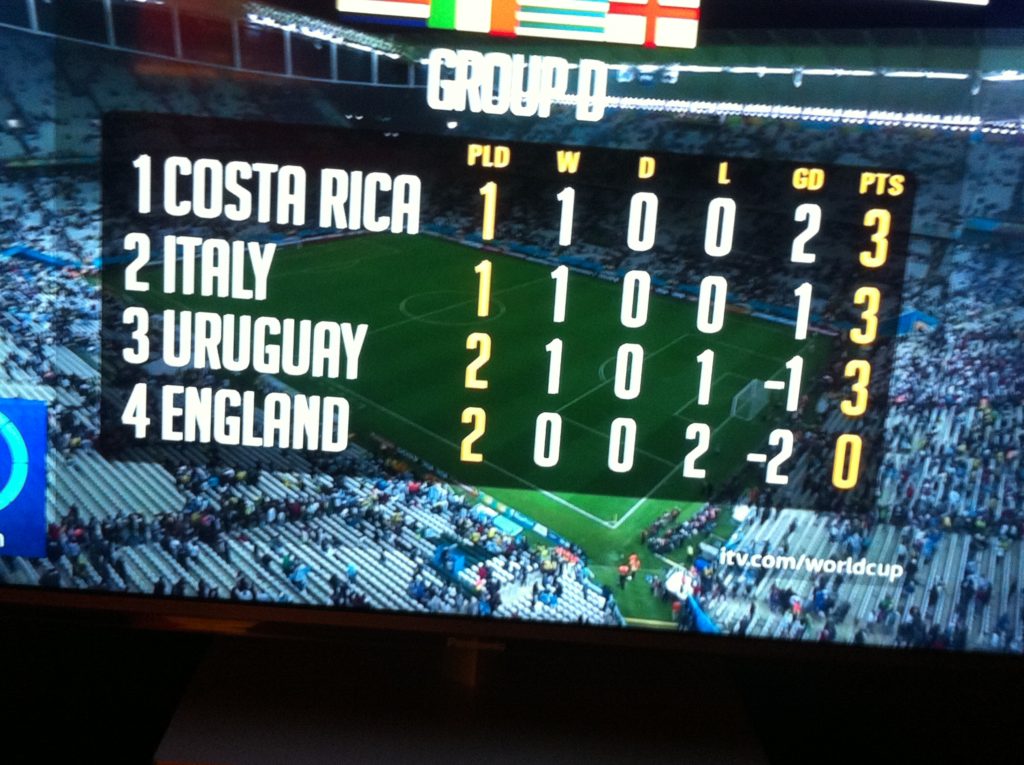
Dark Blues decline
To be honest the signs were all there. Scotland, despite our passion and gallusness, had never been among the elite to qualify for the European Championships – a smaller competition of just eight teams, In fact, our debut appearance wasn’t until 1992 in Sweden – only after the finalist cohort was increased from 16 to 24 teams.
While the number of countries qualifying for the world cup finals increased, (From 16 in 1978 to 24 teams in 1982 and 32 since 1998) so did qualifying rounds. When Scotland beat Czechoslovakia in 1973 there were only three teams in a group, compared to six teams currently and around 10 qualifying fixtures.
Post Communism
Another unhelpful development was the break-up of communism in Eastern Europe after 1990. While USSR and Yugoslavia were regular qualifiers at both European and World Cup finals, their fragmentation added around 20 more countries to FIFA, from Azerbaijan to Uzbekistan.
Russia and Yugoslavia were regular Euro finalists win six apperances between them from 1960 to 1988. Many have a strong footballing tradition and Ukraine, for example, has a population of over 40 million people.
By contrast, Croatia, with a population of just four million, gained independence in 1991. By 1998 they were third place in World Cup and have only failed to reach one European Championships and one World Cup since then. 20 years after it was formed, Croatia reached the World Cup final famously beating England in the semi-final in 2018: Who believes wee nations can’t make it politically or on the football pitch?
Africa Advancing
You might think this would make Scotland a bigger fish in bigger pond, but other influences were at play. In 1974, Zaire conceded 14 goals in three games and Scotland went out without losing a game.
By Italia 1990, Cameroon beat the holders in the opening game and England needed two late penalties, one in extra time to edge through to the semi-finals. African football had arrived and has continues to flourish.
While Scots and Irish ‘tanner baw’ players bulked up the ranks of the English game in the 70s, by the 90s it was African nations who are unearthing potential global superstars. Just take a look at the colonial background of France’s world cup winning team of 2018.

Football is not an island. Other pursuits, internet gaming and a more sedentary lifestyle means that there are more distractions for Scottish kids other than football.
But let’s keep it in perspective. While Kirk Broadfoot (sometime pronounced ‘Clubfoot’) has four Scotland caps, Northern Ireland’s George Best and Wales Ian Rush never got the chance to show off their undoubtedly world-class skills in a major football tournament. (Football) Life can be cruel.
Reckless Rangers
If these were external factors to our demise, they were compounded by financial and aspirational dynamics within the Scottish league football itself which have fundamentally undermined the national game.
David Murray’s threat that for every fiver Celtic spent, Rangers would spend a tenner set off a nuclear arms race between Scotland’s Old Firm. During the 1990s he led Rangers on a reckless spending spree to try emulate Celtic’s capture of the European Cup in 1967.

It saw the likes of England captain Terry Butcher and Paul Gascoigne join Rangers as Murray tried to bankroll a Glasgow Galacticos to European glory.
This forced Celtic into a parallel footballing recruitment drive. And home-grown talent was squeezed out as both clubs bought big name foreigners and ready-made recruits to match up.
While Rangers did equal Celtic’s nine-in-a-row league record, Murray’s titles were tainted when it was discovered that they were using illegal tax breaks to attract players they could not otherwise afford and win trophies and titles they might not otherwise have won.

This was financial doping and football cheating on an industrial scale. Once uncovered, the tax authorities moved in on the pyramid scheme and demanded tax liabilities, Murray had quickly sold the club for one pound and left the scene of the crime.
Liquidation
Glasgow Rangers and all their history were liquidated and they had to start from scratch as a new outfit, known by trading name, Sevco Scotland Ltd. Court cases, litigation and blame continue to this day; even the police and legal establishment accused of malpractice in this never-ending crime scene.


There is no doubt that the Murray’s arms race forced Celtic on the back foot and the national game has suffered because Scots players were unable to develop through to first team level, many leaving to join English championship which has become the Scotland standard.
And the loss of home-grown players playing for Celtic or Rangers at a high competitive level and in European competition has stymied the quality of the national eleven where both clubs would supply the bulk of the squad a generation before.
The Wildnerness Years
This combined not only into a decline but also a healthy dose of realisation for the average member of the Tartan Army. Expectations were suitable dialled down by fans like me.
Still, we could always rely on England to give us the last laugh.
Brian Clough said that the only certainty in football is failure. The maverick manager was on the money. There were only three domestic trophies to win and you were bound to fail more than succeed by the law of averages.
It was the same lesson my dad taught me about gambling. The bookies was down a horrible little piss-and-sick-ridden lane off the shops at the top of hill as Radnor Park is known. Drunk men staggered in and out of it; “from bar to street to bookie” as Squeeze eloquently sang it.
How does betting work I asked my teetotal, non-gambling dad. “I’ll tell you how it works son. There are three windows paying in… and wan paying oot!” It was a powerful lesson.
Back to football and the great thing is that an early exit gets the humiliation and embarrassment over done with. But the bigger they are the harder they fall. And we are just a wee nation while England, from the media down, are always prone to hubris.
ABE (Anyone But England) has been a safe haven for many Scots over the years. The English ask “We support you at football, why don’t you support us?”. Because you won the World Cup once and you’ve never stopped going on about since then*.

*See also, 30 years of Hurt – I’ll translate that for you. “No one, but no one, should ever win it bar us, England.”
And for every Faroe Islands 1 Scotland 1, there is a England 1 Iceland 2 knockout or elimination on penalties. Yes, contemptible as it is, there will always be a ‘wally with a brolly’ or a ‘do-I-not-like-that’ character or a ‘hand of god’ moment. Have you ever seen the easy draws these guys always get.
I recall being in coming to London in 1980. I was living in a work hostel. That summer England played in the Euros. It was a dark sweaty basement tv room. When Marco Tardelli scored after 79 minutes against England it was the Scots, Welsh and Irish punching the smoke-filled air.
Of course, it had always been acceptable and commong to be ABE. Some Scots of a Celtic persuasion (hard or soft “C” here) could be found supporting other nations, such as Eire, who eased the playing requirements and were then punching above their weight and regularly reaching major tournaments. Their 1-0 victory against England in 1988, incidentally, with a goal scored by Glasgow born, Ray Houghton, is definitely one I savoured.

But you never miss the water till the well runs dry. The truth is people my age were spoiled in an era of Scottish involvement, if not success.
While I had long ago hung up the public tartan scarf, I always wanted them to do well. I was just aware of our place in the footballing food chain. To be honest, it is now the global game as well as the beautiful game I grew up with.
It’s a simple game and we were once regular diners at the top table. So I don’t expect too much from the current squad. I will cheer them on as I did last Thursday against Serbia. I will never take success or involvement for granted.
A little bit of meekness goes a long way. I will cherish the huge personal emotive highs that the Scotland team have given me over the years.
We are more of tennis nation now I tell me English friends. We have given so much to enrich British sport with athletes like Andy Murray and… Jocky Wilson.
You can’t bottle desire
But it would be churlish to suggest only Scotland has suffered from structural changes to the game. Whereas we would be selling the likes of Dalglish, Hay, Macari and Nicholas to top English teams, now it’s foreign prospects such as Dembele, Wanyama or Van Dijk who go south or abroad for top dollar.
And the global reach of the English Premier League has affected the English national side and its prospects. While previously is was an imperialist superiority complex and a jingoistic media which was England’s downfall; now it’s a lack of opportunity for home grown players.

Football has always generally been a working-class game. And as long as there is such massive social inequality there will always be the gallus underdog; the street fighter – like Pele, Maradona, Ronaldo, Henry… and perm any African from George Weah to Didier Drogba.
If football is your way out of ghetto you sink your heart and soul into it. As well as a street game, it’s an economic game; an mirror on an unequal world.
It reminds me of the Victorian quote about the class difference between rugby and football. “Rugby is a gentleman’s game played by thugs and football is a thug’s game played by gentlemen.”
Barrow-boy upskilling
British, indeed Western society has it so easy in comparison to African and South American nations. Around the same time there was a technocratic managerialism applied English football which saw the rise of elitist sporting academies like Lillieshall which opened in 1984 and is recently repurposed as a wedding venue.
This school of excellence approach, while plausible, is middle-class intellectualism applied to the beautiful game. It was the sort of philosophy which saw England rugby manager Clive Woodward working with Southampton as a technical coach.
If England’s route has any lesson, it is that you cannot design the perfect player or team through motivation skills, physical fitness and an analytical or tactical mind alone.
So, if the BBC Transport correspondent can become the Economic expert, we are all capable. It’s just barrow-boy reductivism.
But sport and football is different. It’s about background, mentality, desire, ability and heart. Things which can’t always be taught. Sure, you can coach me at ballroom dancing, but I’ll never win Strictly. There is a balance between coaching and natural ability.
Look at homegrown talent coming through now from the council estates, like Rashford and Sterling. You can’t bottle desire and ability.
Talking ’bout next generation
Scotland has struggled for football relevance for many years now. Since the turn of the century our home-grown players have generally been English Championship level at best and our results have reflected that.
Our aspirations are now on the same page as our actuality; even with David Marshall’s fantastic save in Serbia. In acceptance, I have reached the end of the grief model journey.
I caught up with my sister Ruth while writing this blog. She asked if I watched the match and she told me how nervous she was watching it, with extra time and the penalties. And savouring sheer ecstasy of the victory.
She happens to be close friends with Mary McGinn, mother of Clydebank-born and raised Scotland midfielder, John McGinn. We talked about his qualities.
John McGinn is a favourite of mine, he tears around the pitch with an industriousness and heart that reminds me of Archie Gemmill. He is a throwback to my younger fan days, when players played for themselves, their family, community and the badge; there is an honesty about him I recognise and admire. It’s as much a social quality as a football talent.
Many footballers are caught in rich global game that is now entertainment and broadband packages over desire. It’s no ones fault. Cultural global capitalism shapes us all.
It’s fantastic that this group of Scotland players have made their own history. I’m so pleased for them and for a younger generation of fans.
My sister Ruth told me her son Marc – born just after the World Cup in September 1998 and now 22 had never seen Scotland appear at a major footballing competition.
Here’s me wallowing in memories, when defeat and failure are all this poor lad had experienced.
I reminded her that there was a dark time in my life around the Belgium game in 2000 when Scotland sunk lower in the official FIFA football rankings than the island the Tom Hanks was shipwrecked on when he starred in the move Castaway.

Now I can watch without the anxiety and expectation that I had growing up and I’m pleased for a new generation of Scots, they too can have a dream.
I used to have one…but I’m all right now. I still remember the words today….
I wonder if England would fancy facing Scotland in a penalty shoot out after Scotlands recent perfect 10?

Globe Trotsky is a retirement travel and photography blog for the independent, budget traveller. A sideways look at travel in a tshirt. Visit www.globetrotsky.com to join the travel and tshirt tribe.
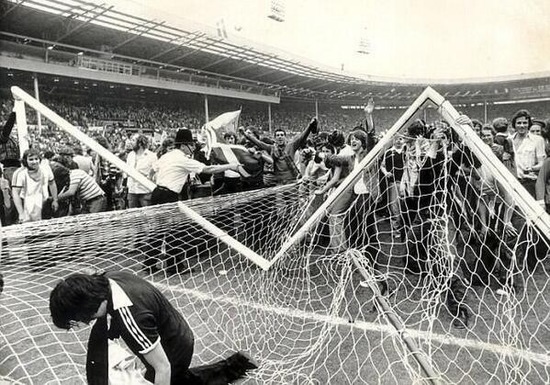



















6 Comments
Tim Wright · at
Interesting reading as always, Chris. I miss the end of season England v Scotland game. In 1974 ( aged 10 ) I was so appalled that England lost 2-0 that I broke my glasses by throwing them against the TV ! A year later I was delighted when Gerry Francis ( then my favourite footballer ) helped England put 5 past poor Stuart Kennedy. In 1976 I had calmed down in my reaction to the late Ray Clemence’s goalkeeping error (partly due to my enormous respect for Kenny Dalglish, who put the ball past him ) . In 1977 I, like many other England supporters, was appalled when the Scotland fans broke the goalposts but, a few years later, I had a schoolfriend from Berwick who was a Scotland fan. His memory of the events was somewhat different :- ‘Och, it was just a bit of wee fun ‘!
admin · at
Cheers Tim. Thanks for taking the time to read another epic post. I shouldn’t have left it 50 years to write it down. I remember the 76 game well when you won 5-1. Ironically I was stuck in a car with English friends on a holiday journey. It was horrendous; character building stuff. I suppose we all took it so seriously as young adults. It certainly scarred both of us by the sound of it. But hopefully I show that in the blog, for different reasons, we have failed for different reasons and are now on different footballing journeys. I think England have been close to success on a few occasions but the weight of expectation – not helped by the national media – has proved too heavy. Plus I think Croatia exploited that last semi-final in Russia. When we learn not to pick scars….they heal. Let’s just say you will win it again before we get out of a group stage. Cheers mate.
Stuart Forster · at
What a journey! The Tartan Army can be a load of fun to have a drink with. Hopefully ‘I Can Boogie’ will be be blasting in Qatar this autumn.
admin · at
Well Stuart that depends what Scotland team turns up in the qualifiers. I won’t get too carried away. Thanks for reading the blog mate.
Billy Massie · at
Chris, I’m pissing myself laughing. Thanks big man.
Globe Trotsky · at
I’m glad you liked Billy. I thought it would appeal to those of a certain era and persuasion.